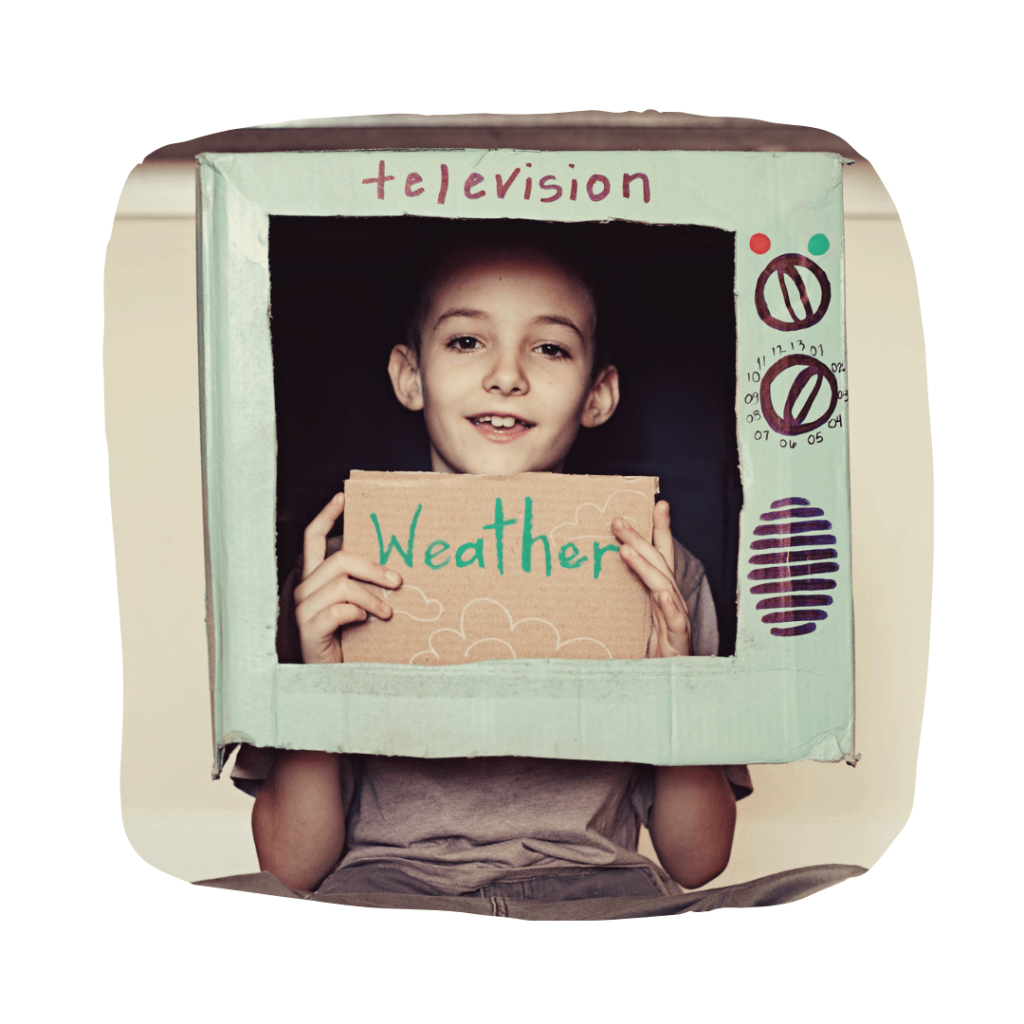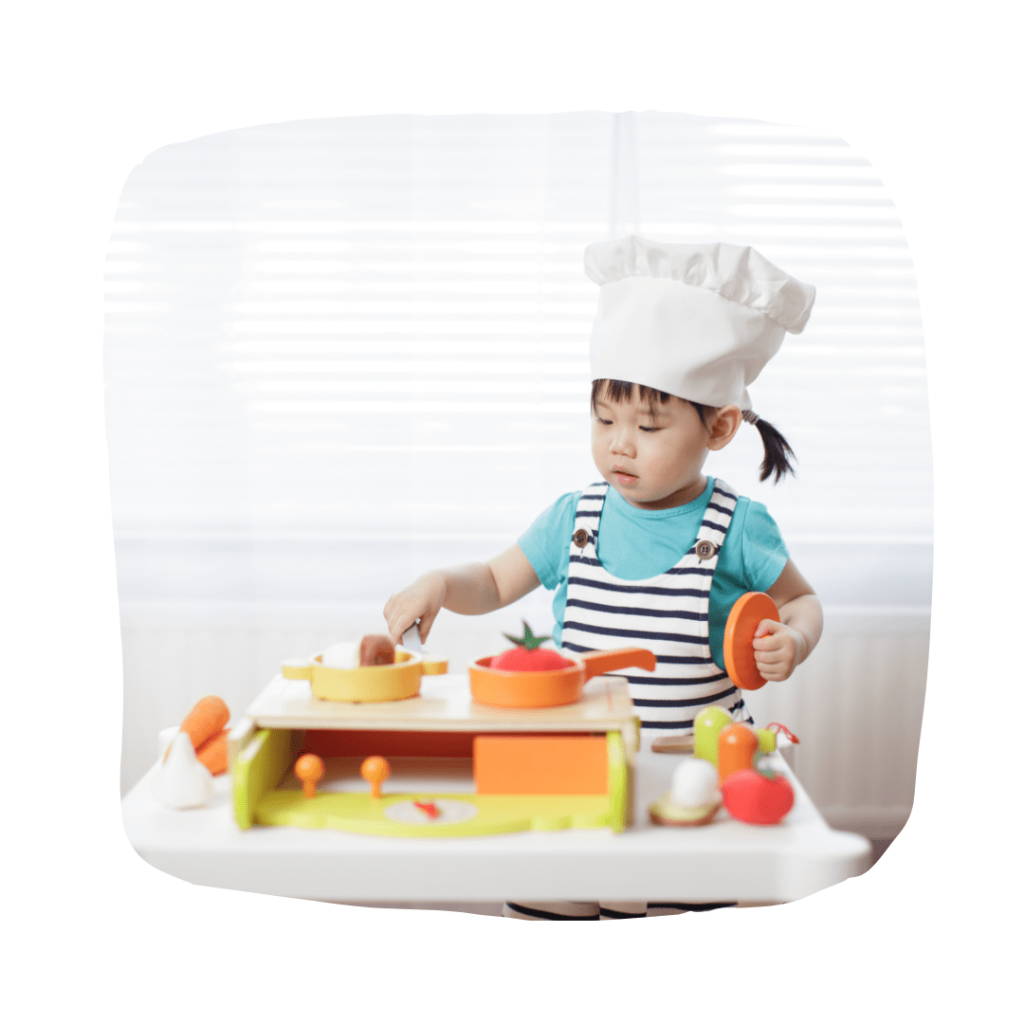Play is the secret superhero in the world of learning. It’s called pretend play, or you might know it as make-believe or imaginative play. You’ve probably seen it when your kiddo decides a shoebox is actually a treasure chest, or they start chattering away with an invisible friend.
But pretend play is so much more than fun and games. It’s like a gym workout for their growing brains, emotions, and social skills. So let’s break down why pretend play is important and how it helps at different stages of your child’s life.

The Benefits of Pretend:
- Brain-Boosting Power
Pretend play is a fantastic brain booster. It’s like the ultimate puzzle for their little noggins, helping them think logically, solve problems, and become flexible thinkers. When your toddler pretends a spoon is an airplane, that’s their brain making a significant cognitive jump. And when older kids weave complicated stories with their toys, it’s like a high-intensity workout for their brain!
- Teaching Them to Walk in Someone Else’s Shoes
When kids step into the shoes of a pirate or a superhero, they’re learning how to see things from different perspectives. This helps them understand others’ feelings and reactions better – a critical part of being human. Playing ‘house’ or ‘school,’ for instance, kids get a chance to navigate relationships and emotions. It’s like their very own soap opera, where they’re the actors, directors, and scriptwriters!
- Words, Words, Words!
Playing pretend is like a language-learning app, but way more fun. As they set up their make-believe worlds, kids get to experiment with new words, phrases, and ways of speaking. Whether they’re negotiating a peace treaty between teddy bears or telling tall tales of space adventures, they’re learning how to communicate effectively.
- Taking Charge of Their Emotions
Pretend play can help kids manage their emotions better and take charge of their thoughts. It’s like a training ground for real-life situations. When playing ‘restaurant,’ they need to take turns, follow rules, and handle the imaginary pressure of hungry customers. These ‘real-life rehearsals’ help them become masters of their feelings and actions.
- Unleashing Their Inner Picasso
Pretend play is a magic key that unlocks your child’s creativity and imagination. Your six-year-old might turn the backyard into a wild jungle or their bed into a castle in the clouds. It’s like they’re the star of their very own, ever-changing adventure movie, coming up with unique ideas and solutions along the way. This kind of imaginative thinking is priceless and sets them up for a future full of creative possibilities.
Unlocking the World of Learning:
Pretend play isn’t just adorable to watch, it’s an essential part of your child’s growth. It helps them think, communicate, understand others, manage emotions, and lets their creativity soar. And as parents, teachers, or mental health experts, our job is to cheer them on from the sidelines and provide a safe, fun space for them to let their imagination run wild.

When do I Start Pretend Play With My Child?
There is no time like the present to introduce pretend play. While there will be different activities depending on your child’s age, this kind of play can be introduced as early as babyhood—and often continues all the way through elementary school. Pretend or imaginative play is beneficial to children of all ages, from 2 months to 12 years.
Examples:
Babies:
- Talking to them
- Playing games like pat-a-cake
- Puts words and motions together.
- Peek-a-boo
- Playing with stuffed animals, mirrors, push toys, and cars.
Toddlers:
- Playtables
- green streamers hanging down from their door frame to represent seaweed (under the sea theme)
- create fictional fishy friends based on directions specifying different shapes and colors
- Hairbrushes and wooden spoons make great microphones for future musicians, telecasters and youtubers.
- Bedding can be used to make tents or blanket forts so you can explore the natural outdoors.
Preschool:
- Feature more complex storylines with multiple characters, which will present them with more challenges and usually involves props, dolls, and/or action figures.
- Playing pretend doctor with stuffed animals
- Learning about foods, eating and grocery store shopping by playing in store or kitchen playsets.
- Feeling autonomous and creative using tools to make and fix practical items.
